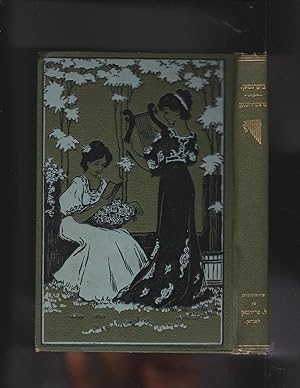Bjornstjerne Martinius Bjornson Translated Yiddish (1 results)
Product Type
- All Product Types
- Books (1)
- Magazines & Periodicals
- Comics
- Sheet Music
- Art, Prints & Posters
- Photographs
- Maps
-
Manuscripts &
Paper Collectibles
Condition
- All Conditions
- New
- Used
Binding
- All Bindings
- Hardcover
- Softcover
Collectible Attributes
- First Edition
- Signed
- Dust Jacket
- Seller-Supplied Images
- Not Printed On Demand
Seller Location
Seller Rating
-
Erzeilungen (Ertseilungen)
Published by L. Friedman, London, England, 1909
Seller: Meir Turner, New York, NY, U.S.A.
Book
Hardcover. Condition: Very Good. No Jacket. In Yiddish. Frontispiece, 163 pages. 216 x 150 mm. Bjornson was a Norwegian poet, novelist, playwright and lyricist. He was born at the farmstead of Bjorgan in Kvikne, a secluded village in the Osterdalen district, c. 60 miles south of Trondheim. In 1837 his father Peder Bjornson, who was the pastor of Kvikne, was transferred to the parish of Nesset, outside Molde in Romsdal. It was in this scenic district that Bjornson spent his childhood, living at the Nesset Parsonage. After a few years studying in the neighboring city Molde, he was sent at the age of 17 to Heltberg Latin School (Heltbergs Studentfabrikk) in Christiania to prepare for university. This was the same school that trained Ibsen, Lie, and Vinje. Bjornson realized early that he wanted to pursue poetry (he had written verses since age 11). He matriculated at the University of Oslo in 1852, soon embarking upon a career as a journalist, focusing on criticism of drama. In 1857 he published Synnove Solbakken, the first of his peasant novels. In 1858 he published Arne, in 1860 En glad Gut (A Happy Boy), in 1868 Fiskerjentene (The Fisher Girls). These are his most important of his bonde-fortellinger or peasant tales. In 1857 he was appointed director of the theatre at Bergen, a post he held for 2 years, when he returned to Christiania. From 1860 to 1863 he travelled widely throughout Europe. In 1865 he undertook the management of the Christiania theatre, and brought out his popular comedy of De Nygifte (The Newly Married) and his romantic tragedy of Mary Stuart in Scotland. In 1870 he published Poems and Songs and the epic cycle Arnljot Gelline; the latter contains the ode Bergliot, one of Bjornson's finest contributions to lyrical poetry. The "national poet" settled on his estate of Aulestad in Gausdal. In 1877 he published another novel, Magnhild, dealing with social questions, and his republican sentiments are evident in the polemical play Kongen (The King). In a later edition of the play, he prefixed an essay on "Intellectual Freedom" in further explanation of his position. Kaptejn Mansana (Captain Mansana), an episode of the war of Italian independence, was written in to 1878. His drama of social life, Leonarda (1879), caused great controversy. A satirical play, Det nye System (The New System), was produced a few weeks later. He produced a social drama, En Handske (A Gauntlet), in 1883, but was unable to persuade any manager to stage it except in a modified form. In the autumn of the same year, he published a mystical or symbolic drama Over Aevne (Beyond Powers), dealing with the abnormal features of religious excitement. It was not performed until 1899, to great success. He became a spokesman for the Norwegian Left-wing movement, supported Ivar Aasen, and joined forces in the political struggles in the 1860s and 1870s. His political views led to his being charged with treason, and he took refuge for a time in Germany, returning to Norway in 1882. Convinced that the theatre was practically closed to him, he turned back to the novel, and published in 1884 Det flager i Byen og paa Havnen (Flags are Flying in Town and Port), embodying his theories on heredity and education. In 1889 his long novel, Paa Guds veje (On God's Path) was published, as well as a comedy, Geografi og Kærlighed (Geography and Love), which met with success. He was interested in the question of the bondemaal, the adopting of a national language for Norway distinct from the dansk-norsk (Dano-Norwegian), in which most Norwegian literature had hitherto been written. Early on, before 1860, he had experimented with at least one short story written in landsmal. During the last 20 years of his life he wrote hundreds of articles in major European papers. Like Zola, he was a staunch supporter of Alfred Dreyfus, and wrote many articles proclaiming his belief in Dreyfus? innocence. He was one of the original members of the Norwegian Nobel Committee from 1901 to 1906. And was himself awarded, in 1903.


